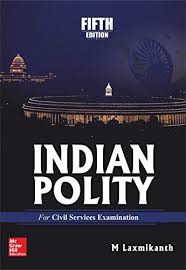 |
polity book -M LAXMIKANTH |
What is Polity?
The system of government called polity is midway between democracy and oligarchy. The subject deals with the functioning of the government in the country. This gives an understanding of the legislative, executive, judicial systems and various constitutional authorities in the country.
POLITY SYLLABUS FOR UPSC PRELIMS.
Indian Polity and Governance Constitution,
Political System,
Panchayati Raj,
Public Policy,
Rights Issues etc.
(Governance, Constitution, Polity, Social Justice and International Relations)
- Indian Constitution—Historical Underpinnings, Evolution, Features, Amendments, Significant Provisions
and Basic Structure. - Functions and Responsibilities of the Union and the States, Issues and Challenges Pertaining to the Federal Structure, Devolution of Powers and Finances up to Local Levels and Challenges Therein.
- Separation of Powers between various organs Dispute Redressal Mechanisms and Institutions.
- Comparison of the Indian Constitutional Scheme with that of Other Countries.
- Parliament and State Legislatures—Structure, Functioning, Conduct of Business, Powers & Privileges and Issues Arising out of these.
- Structure, Organization
and Functioning of the Executive and the Judiciary—Ministries and Departments of the Government; Pressure Groups and Formal/Informal Associations and their Role in the Polity. - Salient Features of the Representation of People’s Act.
- Appointment to various Constitutional Posts, Powers, Functions
and Responsibilities of various Constitutional Bodies. - Statutory, Regulatory and various Quasi-judicial Bodies.
- Government Policies and Interventions for Development in various sectors and Issues arising out of their Design and Implementation.
Development Processes and the Development Industry — the Role of NGOs, SHGs, various groups and associations, donors, charities, institutional and other stakeholders. - Welfare Schemes for Vulnerable Sections of the population by the Centre and States and the Performance of these Schemes; Mechanisms, Laws, Institutions
and Bodies constituted for the Protection and Betterment of these Vulnerable Sections. - Issues Relating to Development and Management of Social Sector/Services relating to Health, Education, Human Resources.
- Issues relating to Poverty and Hunger.
- Important Aspects of Governance, Transparency
and Accountability, E-governance- applications, models, successes, limitations, and potential; Citizens Charters, Transparency & Accountability and institutional and other measures. - Role of Civil Services in a Democracy.
- India and its Neighborhood- Relations.
- Bilateral, Regional and Global Groupings and Agreements involving India and/or affecting India’s interests.
- Effect of Policies and Politics of Developed and Developing Countries on India’s interests, Indian Diaspora.
- Important International Institutions, agencies
and fora - their Structure, Mandate.

ConversionConversion EmoticonEmoticon